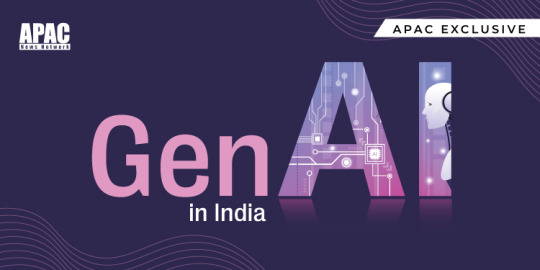#GenAI in India
Explore tagged Tumblr posts
Text
GenAI in India: Tech Industry Partnerships Catalyze Adoption

The likes of IBM, Tech Mahindra, Google Cloud, Netapp, Deloitte, ServiceNow and the likes are all jumping into the GenAI bandwagon. APAC News Network explores the dynamics of some of these partnerships.
GenAI or Generative AI is fast gaining grounds in India, especially in terms of acceptance by different stakeholders. These include the different enterprises across different verticals using GenAI in different facets of their businesses. Another stakeholder has been the Indian GenAI-based SaaS startups whose numbers too are rapidly rising every year. Add to this the IT services giants and software giants who too are jumping into the GenAI bandwagon. Last but not the least, the government too is supporting the GenAI revolution with proactive policy formation and creating appropriate implementation environment in the country.
Worldwide there is an explosion in the number of Gen AI-native SaaS companies and a surge in investment capital, with over $12 billion funneled into 60+ emerging domains in FY23 alone. The Indian players, on the other hand, raised $590 million in funding during the same time period. While globally there are 259 generative AI startups as of 2024, in India there are around 20+ pure-play generative AI startups.
Also Read More Here : https://apacnewsnetwork.com/2024/04/genai-in-india-tech-industry-partnerships-catalyze-adoption/
#GenAI in India Tech Industry Partnerships Catalyze Adoption#GenAI in India#Tech Industry Partnerships Catalyze Adoption#Sandip Patel#MD#IBM India#Sandip Patel MD IBM India#Chetan Krishnamurthy#VP#Ecosystem and Digital Sales#Asia Pacific#IBM#Chetan Krishnamurthy VP Ecosystem and Digital Sales Asia Pacific IBM#Karthik Rajaram VP & GM Elastic India#Sunil Gupta#Co-Founder#MD and CEO#Yotta Data Services#Sunil Gupta Co-Founder MD and CEO Yotta Data Services#Pravjit Tiwana#SVP & GM#Cloud Storage#NetApp#Pravjit Tiwana SVP & GM Cloud Storage NetApp#Anshul Shrivastava CEO Vodex#Bhaskar Majumdar Managing Partner Unicorn India Ventures
0 notes
Text

India's Volkai, developed by Kairosoft AI Solutions, is making waves as a culturally intelligent, affordable alternative to global AI platforms like DeepSeek, ChatGPT, and Midjourney. Launched in 2025, Volkai integrates text and image generation, offering cutting-edge AI tools tailored for the Indian market.
𝐖𝐡𝐲 𝐕𝐨𝐥𝐤𝐚𝐢 𝐒𝐭𝐚𝐧𝐝𝐬 𝐎𝐮𝐭:
𝐀𝐟𝐟𝐨𝐫𝐝𝐚𝐛𝐥𝐞 & 𝐎𝐩𝐭𝐢𝐦𝐢𝐳𝐞𝐝 for mid-range devices, making AI accessible to startups, students, and small businesses
𝐈𝐧𝐭𝐞𝐠𝐫𝐚𝐭𝐞𝐝 𝐓𝐞𝐱𝐭 & 𝐈𝐦𝐚𝐠𝐞 𝐆𝐞𝐧𝐞𝐫𝐚𝐭𝐢𝐨𝐧 for seamless content creation in marketing, education, and e-commerce
𝐂𝐮𝐥𝐭𝐮𝐫𝐚𝐥 𝐈𝐧𝐭𝐞𝐥𝐥𝐢𝐠𝐞𝐧𝐜𝐞—creates India-specific content, understanding dialects, traditions, and regional nuances
#general knowledge#affairsmastery#generalknowledge#current events#current news#india#upscaspirants#generalknowledgeindia#upsc#upsc current affairs#upsc2025#upscpreparation#iaspreparation#chatgpt#ai chatbot#openai#intelligence artificielle#ai technology#genai#artificial intelligence#machine learning#india news#breaking news#world news#news#technology#tech#techinnovation#technews#deepseek
3 notes
·
View notes
Text
Key Services Offered by GenAI Consulting Firms in India
The advent of Generative AI (GenAI) has transformed the operations of businesses with enhanced automation, data analysis, and content generation abilities. With machine learning models able to produce human-like text, images, and even code, organisations are now more and more using GenAI to increase productivity and simplify processes.
As companies from various industries venture into AI-led transformation, the need for GenAI consulting firms in India has picked up pace. Firms need professional advice to deploy AI solutions that are specifically designed to meet their requirements, with efficiency, scalability, and regulatory compliance in mind. From strategy development using AI to large-scale deployment across enterprises, consulting firms are the key to unlocking the true potential of GenAI technologies.
0 notes
Text
Marketing World Powered by AI 🤖 Step into a realm where artificial intelligence transforms imagination into reality. This futuristic vision is not tomorrow—it’s happening now. 🌌 AI is reshaping how we connect, create, and market in ways we never dreamed possible. Ready to lead the charge? 💡
Know more about us @ https://mindsofbrands.com & Lets Connect @ [email protected]
#ecommerce#minds of brands#digital marketing#soccer#startup#north america#adidas#design#entrepreneur#south america#united states of america#ai technology#chatgpt#bussiness#genai#generative ai#india#America#marketing#branding#business#emailmarketing#lead generation
0 notes
Text
India Leads Global Generative AI Adoption: 81% of Enterprises Implement Solutions
India emerges as a leader in AI, with 81% of firms adopting GenAI for efficiency in sectors like healthcare and finance, driving innovation and investment.
#thecioconnect#OnlineBusinessMagazine#BusinessMagazine#businessleaders#GenAI#AIGrowth#India#DigitalTransformation#Enterprises
0 notes
Text
10 Profitable Indian Startups: A SWOT Analysis.

The steady growth of the Indian economy and the spurt in consumer index has given rise to numerous startups or online-native companies over the last decade or so. Some of these companies garnered recognition from consumers and international investors and soon became giants. For some, after the initial euphoria of high valuations and brand equities, they have got mired in controversies. There are a few who have moved silently and are today witnessing profits on their bottomlines.
ALSO READ MORE- https://apacnewsnetwork.com/2024/07/10-profitable-indian-startups-a-swot-analysis/
#10 Profitable Indian Startups#10 Profitable Indian Startups: A SWOT Analysis#10 Profitable Startups#10 Profitable Startups Indian#A SWOT Analysis#analyzes 10 Profitable Indian Startups#BillDesk#BillDesk India’s Preferred Payment Gateway#Capitalizing on Indian Cricket’s Dream Run#CEO & Founder at Nykaa#Chai pe Charcha Through GenAI#Co-Founder at Zerodha#Democratizing Stock Investing#Dream11#Dream11 Profitable Indian Startup#Dream11: Capitalizing on Indian Cricket’s Dream Run#EaseMyTrip#EaseMyTrip Rise of the Online Travel Agent#Falguni Nayar#Falguni Nayar CEO & Founder at Nykaa#Founder & CEO at Zerodha#Gupshup#Gupshup Chai pe Charcha Through GenAI#India’s Preferred Payment Gateway#Inframarket#Inframarket Construction Sector Gets a Digital Makeover#Mamaearth Eco-Friendly Touch for Babies and Moms#Nikhil Kamath#Nikhil Kamath Co-Founder at Zerodha#Nithin Kamath
0 notes
Text
Deloitte and Yotta Data Services Revolutionize AI Development in India with GenAI Collaboration
Deloitte and Yotta Data Services Revolutionize AI Development in India with GenAI Collaboration #Deloitte #YottaData #GenAI #NVIDIA #GPUcomputing #AI #digitaltransformation #India
Deloitte India and Yotta Data Services have forged a transformative alliance to propel India’s AI landscape forward. This collaboration leverages Deloitte’s profound expertise in artificial intelligence (AI) and Yotta’s state-of-the-art GPU cloud platform to empower businesses and governments in India to develop innovative GenAI applications. As India embarks on a digital transformation journey,��

View On WordPress
#AI services#Artificial Intelligence#Deloitte#Digital Transformation#GenAI#GPU computing#India#NVIDIA#Yotta Data Services
0 notes
Text
DPIIT and Kyndryl sign MoU to scale India’s start-up ecosystem
The Department for Promotion of Industry and Internal Trade (DPIIT), Government of India, and Kyndryl Solutions have signed a Memorandum of Understanding (MoU) to accelerate innovation and scale India’s start-up ecosystem. The partnership will focus on supporting start-ups in the manufacturing and IT sectors by leveraging Kyndryl’s expertise in digital transformation and GenAI solutions. Joint…
0 notes
Text
UIDAI partner with Sarvam AI to increase Udhar services
The Unique Identification Authority of India (UIDA) has amended an Ammoproving base services to deploy an indigenous Jeanai Solutions with the Bengali-based AI (Genai) company Saravam AI. Increasing user experience. Also read: Government of India allows private institutions to face Aadhaar AI operated services With the implementation of the agreement from 18 March, Saravam will deploy the AI…
0 notes
Text
India Leads in GenAI Adoption with 1.3 Million Enrollments, but Women Lag at 29.6%: Report

India has emerged as the global leader in Generative AI (GenAI) adoption, recording 1.3 million AI enrollments in 2024—the highest of any country worldwide. However, despite this rapid growth, a new report by Coursera, titled "Closing the Gender Gap in GenAI Skills", reveals a persistent gender disparity in AI learning and participation.
Gender Disparity in GenAI Learning
While India ranks second globally in GenAI enrollments among women learners, they account for just 29.6% of total GenAI enrollments in the country. This is despite the fact that women make up 40% of all learners on the Coursera platform. Globally, women’s share in GenAI enrollments stands slightly higher at 32%.
The Coursera report explores strategies to bridge this gender gap, emphasizing the need for targeted interventions to ensure equitable access to AI education and encourage more women to take on leadership roles in the field.
Rising Interest Among Women, Yet Barriers Persist
Interest in AI education in India is growing rapidly. In 2024, Coursera recorded a fourfold increase in GenAI enrollments from India, with women learners showing a remarkable 296% growth rate—outpacing the 191% growth rate among men.
However, despite this surge, several challenges continue to hinder women’s full participation in AI education and careers. These barriers include:
Confidence gaps
Time constraints
Perceived lack of relevance
Absence of female role models
The Need for Gender-Inclusive AI Education
The report underscores the importance of gender-inclusive policies to support women's participation in AI learning. Encouraging mentorship programs, flexible learning options, and increased industry representation can help bridge the gender gap and empower more women to thrive in AI-driven careers.
As GenAI continues to shape industries and job markets, addressing these gender disparities is crucial to ensuring a more equitable and diverse AI workforce in India and beyond.
For further insights, visit the full report on Coursera's website.
0 notes
Text
0 notes
Text
AI spending in India to grow 2.2x faster than digital tech in 3 years, generating USD 115 billion of economic impact: IDC
NEW DELHI: Spending on Artificial Intelligence (AI) technologies will grow at 2.2x the rate of overall digital technology spending in the next three years, generating an India economic impact of over USD 115 billion by the end of 2027, according to a latest report by International Data Corporation (IDC).IDC further predicts that by 2027, company executives would expect their GenAI projects to…
0 notes
Text
9 Out Of 10 Retailers Now Adopting Or Piloting Ai, Newest Nvidia Survey Finds Nvidia Weblog
Many smaller corporations are also creating gen-AI-supported level options for these entry-level use cases. An increasing number of organizations in India are adopting GenAI-driven solutions to fulfill various client calls for, improve effectivity, and foster innovation, enabling growth and adaptableness even with resource constraints. 48% survey respondents shared that they’ve already initiated…

View On WordPress
0 notes
Text
GenAI to Boost India's IT Industry's Productivity by Up to 45 Percent, EY India Survey Shows | Daily Reports Online
The increasing use of generative artificial intelligence (GenAI) could boost the productivity of India’s $254-billion software industry by 43 percent-45 percent over the next five years, according to a survey by consulting firm EY India. This productivity boost, which EY India’s survey states will span 500 roles, will come through the dual effect of the IT industry itself integrating elements of…
0 notes